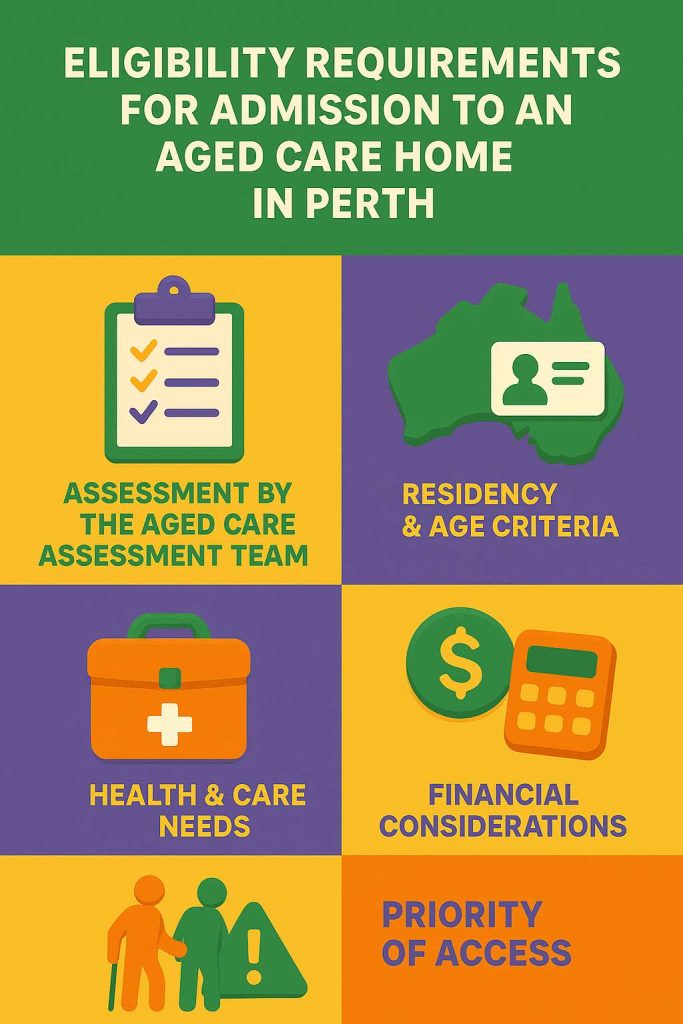Admission into an aged care home in Perth is subject to a set of eligibility criteria established by the Australian Government. These requirements ensure that residential aged care services are directed towards those who need them most. For families, understanding these conditions helps avoid delays in the application process and provides clarity on what support options are available. Eligibility is not based solely on age, but on a combination of health, living arrangements, and personal care needs. The process is structured to balance fairness, need, and access to resources.
Assessment by the Aged Care Assessment Team (ACAT)
The assessment by the Aged Care Assessment Team (ACAT) is the key gateway to entering residential aged care. An ACAT assessor, often a nurse, doctor, or social worker, will meet with the applicant to evaluate their physical health, cognitive function, and day-to-day challenges. This process may include reviewing medical history, current medications, and the level of support already in place at home. The outcome of this assessment provides an approval letter outlining whether the applicant qualifies for permanent residential care, respite care, or other support services. Without this approval, admission into a facility cannot proceed. Families are encouraged to prepare documentation such as health records, pension details, and current living arrangements to support a smoother assessment.
Residency & Age Criteria
Eligibility for aged care in Australia requires the applicant to be an Australian citizen, a permanent resident, or an individual with an eligible visa. Proof of residency or visa status must be provided during the application process. Although the system is primarily designed for older Australians, younger people with severe disabilities, early-onset dementia, or other significant medical conditions may also qualify. Importantly, there is no minimum age requirement, but the ACAT must confirm that the person’s care needs cannot be met adequately at home. For older Australians, this step is often taken when home care packages or community-based support are no longer sufficient. Residency checks ensure that subsidised care places remain available to those with established ties to Australia.
Health & Care Needs
A major eligibility factor is demonstrating that the applicant has care needs that cannot be managed independently or through community support. This includes assistance with daily activities such as bathing, dressing, toileting, eating, and mobility. Cognitive assessments are also carried out to determine whether memory loss, dementia, or other conditions impact the person’s ability to live safely without supervision. The ACAT will also consider risks such as frequent falls, malnutrition, medication mismanagement, or social isolation. The higher the level of dependency, the more likely it is that the applicant will qualify for residential aged care. It is important to note that admission is not based on convenience but on genuine health and safety needs that cannot be met in the home environment.

Financial Considerations
While clinical need is the primary eligibility factor, financial considerations affect the type and cost of care a resident receives. Applicants must undergo an income and assets assessment conducted by Services Australia to determine their contribution towards aged care fees. These fees may include a basic daily fee (to cover meals, cleaning, and services), a means-tested care fee, and accommodation payments. For those with limited income or assets, the government provides subsidies to reduce the cost of care. Families should plan ahead and seek financial advice to understand the potential out-of-pocket expenses, as well as options for paying accommodation bonds or daily payments. This step ensures that individuals are financially prepared before moving into residential care.
Priority of Access
Places in aged care homes are limited, and priority is given to those with the highest and most urgent care needs. Applicants who are at risk of injury, neglect, or serious health deterioration without residential care may be fast-tracked for placement. Other priority factors include whether the person is living alone without support, whether they have a carer who can no longer provide care, or if they require specialised services such as dementia support. In less urgent cases, families may experience waiting periods before a placement becomes available. To reduce stress, it is advisable to apply as early as possible, even if care is not immediately required, so that approvals and assessments are already in place when the need arises.
Conclusion
Qualifying for an Aged Care Home Perth requires meeting both health-related and administrative eligibility requirements. The ACAT assessment is the foundation of the process, followed by residency verification, financial testing, and priority allocation. Each step ensures that care is provided fairly and that resources are directed to individuals with genuine needs. Families planning for aged care should seek professional guidance early, as the application process can take time and requires supporting documents. By understanding the eligibility framework, families can make informed choices and secure timely access to residential care. Exploring the broader range of Aged Care Perth services can also help identify alternative or supplementary options while awaiting placement.
